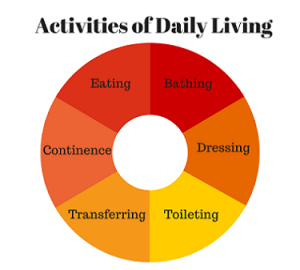
Digital Activities of Daily Living: A Foundational Paradigm for Cybersecurity
In the realm of public health, the concept of “Activities of Daily Living” (ADL) has been a cornerstone since the 1950s. ADLs are the essential activities individuals must perform to live independently, such as eating, bathing, dressing, and managing personal hygiene. These foundational tasks provide a helpful framework for assessing the functional status of individuals and designing interventions to improve health and quality of life. In the modern age, where do essential digital activities fit in?
Healthcare and public health communities utilize Activities of Daily Living to assess independence and quality of life, enable early intervention, and provide personalized care. They also support a holistic approach to health by targeting necessary treatments and serving as key indicators for improving overall well-being. Translating these concepts to the digital world can similarly aid in targeted interventions, progress monitoring, resource allocation, and policy development, fostering a structured and proactive approach to digital security.
Drawing inspiration from this well-established concept in public health, this post explores “Digital Activities of Daily Living” (DADL) as a foundational idea for cybersecurity as introduced in the recent workshop report on Cyber Public Health. DADLs represent the critical digital tasks that individuals, organizations, and even nations must perform to maintain a healthy and secure cyber ecosystem. Just as ADLs are crucial for physical well-being, DADLs are essential for modern digital well-being.
What Are Digital Activities of Daily Living?
DADLs are integral to modern daily life, ensuring connectivity, productivity, financial management, and access to information and services. Just as ADLs are vital for physical well-being, DADLs are essential for digital fluency and effective online living. Examples of today’s digital daily living include online shopping, navigation, file management and cloud storage, communicating, and online banking. The complete list of DADLs remains to be researched and defined.
The Utility of Defining DADLs
Establishing a clear and comprehensive list of DADLs offers several benefits:
- Standardization: A standardized list of DADLs provides a common framework for cybersecurity education, training, and awareness programs. This ensures that everyone—from individuals to large organizations—understands the basic activities required to maintain digital health.
- Assessment: Just as evaluations of ADLs are used to assess an individual’s ability to live independently, evaluations of DADLs can be used to assess an individual’s or organization’s cybersecurity posture. Regular assessment of DADLs can highlight areas needing improvement.
- Intervention Design: Public health interventions often focus on improving ADLs. Similarly, cybersecurity initiatives can be designed to support and enhance DADLs, providing targeted resources and tools to help individuals and organizations perform these critical activities effectively.
- Policy Development: Policymakers can use the concept of DADLs to craft regulations and guidelines that promote cybersecurity best practices. By ensuring that essential digital activities are performed regularly, we can enhance the overall security of the cyber ecosystem.
Why Should You Get Involved?
The cybersecurity landscape is ever-evolving, with new threats emerging constantly. By embracing the concept of DADLs, together we can create a proactive and resilient digital environment. Here’s how you can contribute:
- Join the Discussion: Engage with cybersecurity professionals and public health experts to refine and expand the list of DADLs. Your insights and experiences are valuable in shaping this foundational concept.
- Educate and Advocate: Share the concept of DADLs within your networks. Educate others about the importance of these daily digital activities and advocate for their inclusion in cybersecurity training and awareness programs.
- Innovate Solutions: Develop tools, resources, and technologies that support the execution of DADLs. From password managers to automated update systems, innovative solutions can simplify these essential tasks.
Conclusion
The introduction of Digital Activities of Daily Living is a call to action for the cybersecurity community. By drawing parallels to the well-established concept of ADLs in public health, we can create a robust framework to enhance our digital well-being. Let’s work together to define, promote, and implement DADLs, ensuring a secure and resilient cyber ecosystem for all.
For more information on how cybersecurity intersects with public health, explore CyberGreen’s Cyber Public Health initiatives and research. Join us in making the digital world a safer place, one daily activity at a time.
To learn more about CyberGreen’s ongoing research and activities, please sign up for the mailing list.
Dr. Josiah Dykstra is the Director of Strategic Initiatives at Trail of Bits. He solves ambitious problems by blending high-end security research with a real-world attacker mentality to fortify the code powering the world’s most critical organizations and devices. Dr. Dykstra is an active speaker and author, including 50+ research articles, and is a co-author of the award-winning book Cybersecurity Myths and Misconceptions (Pearson, 2023).
[…] “DADLs represent the critical digital tasks that individuals, organizations, and even nations must perform to maintain a healthy and secure cyber ecosystem. Just as ADLs are crucial for physical well-being, DADLs are essential for modern digital well-being,” Josiah Dykstra, director, Strategic Initiatives, Trail of Bits, wrote in a recent CyberGreen blog. […]